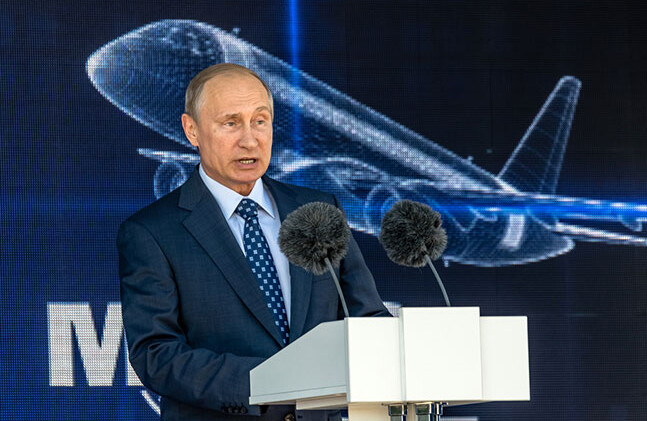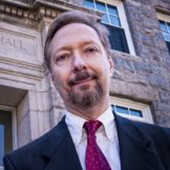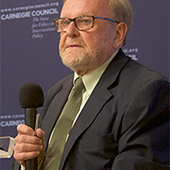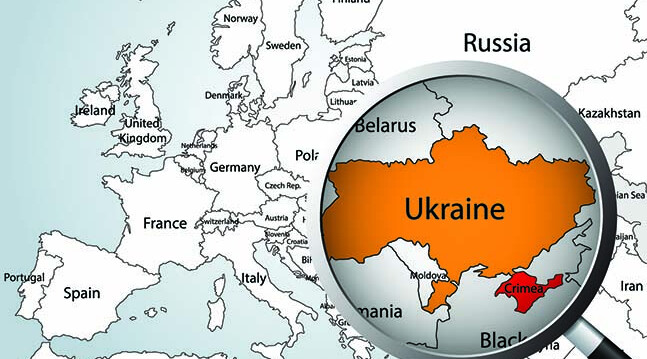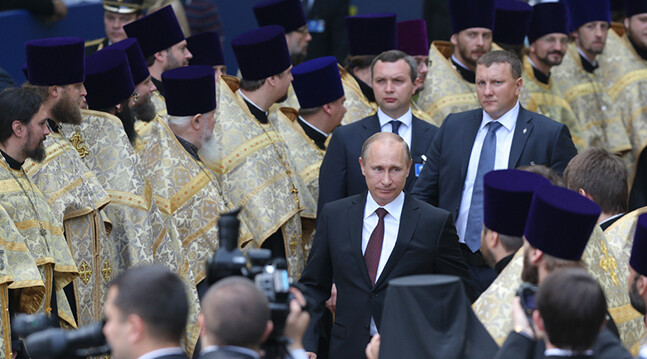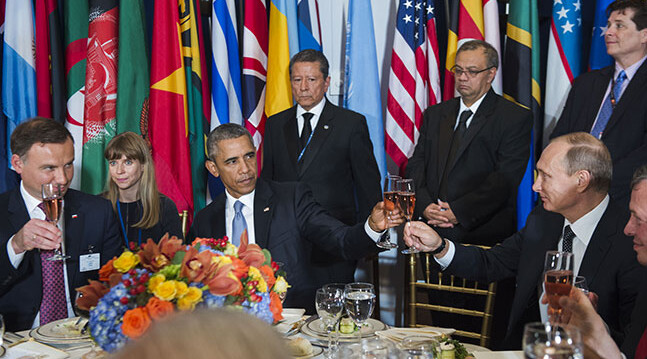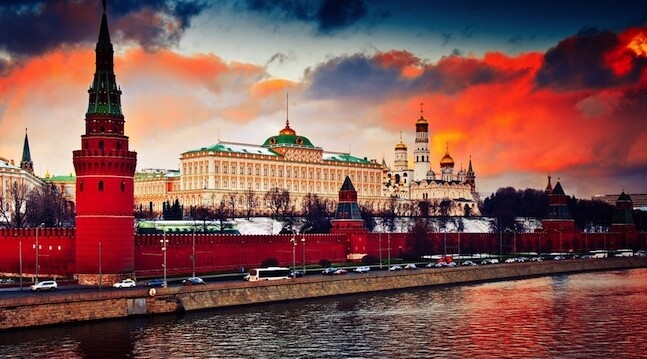Professor Nicolai Petro was one of a few American experts to attend the Valdai Discussion Club, an annual conference in Moscow on Russia's foreign policy attended by President Vladimir Putin. Here, Petro discusses Putin's worldview and the Russian military intervention in Syria and analyzes the recent elections in Ukraine.
DAVID SPEEDIE: I'm David Speedie, director of the program on U.S. Global Engagement here at the Carnegie Council for Ethics in International Affairs. Welcome to another of our occasional Ethics in Security Bulletins.
Our guest today is an old friend, Dr. Nicolai Petro from the University of Rhode Island. Nicolai is a professor of comparative and international politics at the University of Rhode Island, and he has served before as an International Affairs Fellow at the Council on Foreign Relations. While in this role, he served as special assistant for policy in the Office of Soviet Union Affairs in the U.S. Department of State and as a temporary political attaché at the U.S. Embassy in Moscow.
He has had numerous awards for his research, including two Fulbrights. His articles have appeared ubiquitously in this country and abroad, especially in Russia. Most relevantly and recently, he was from July 2013 to July 2014 a Fulbright Research Scholar affiliated with the I. I. Mechnikov National University in Odessa, Ukraine, where of course he joined us for a number of podcast interviews on the Ukrainian crisis.
Nicolai, welcome back.
NICOLAI PETRO: Hello, David.
DAVID SPEEDIE: Good to be with you again.
NICOLAI PETRO: I agree with you.
DAVID SPEEDIE: Nicolai, you were recently at the Valdai conference in Russia. For those who are not quite sure what Valdai is, what is Valdai? What is its purpose, how often does it meet, who goes? Tell us a little bit about the Valdai meeting.
NICOLAI PETRO: The Valdai Discussion Club, as it is known, it an annual conference of specialists on Russia from around the world who are brought to Russia at the invitation of various Russian government and private institutions. They get a chance to meet with their Russian counterparts and with top officials in government. Traditionally, the concluding sessions of each meeting include meetings with the foreign minister and the president of Russia.
DAVID SPEEDIE: You mentioned in a private conversation we had that Putin was indeed there. You said he was in good form. What did he have to say?
NICOLAI PETRO: Yes, he had a speech to give. It was not as lengthy a speech this time as in previous years. He spent quite a bit more time answering questions from the audience this time.
If I could spend a few moments summarizing his main points, I would say that he addressed the topic of the conference, which was issues of war and peace. He took a bit of a distant view. He said, "Peace does not come by itself; it is the result of the establishment and support of balances of power." "Competition," he said, "is a fact of life in international politics, but it needs to be conducted in specific political, legal, and moral guidelines."
He felt it was sad that the certain immunity against warfare which had developed after World War II seems to have been lost and that today he impugned attempts to establish dominance in world affairs, specifically to the United States, and that such attempts unbalance the system and make the competition—which is natural in international politics—unmanageable. The results of this will be to increase local wars and end the nonproliferation of weapons of mass destruction. He specifically cited the withdrawal of the United States from the ABM Treaty [anti-ballistic missile] in 2002 as setting the tone for this.
Then he sort of did an aside and stressed that U.S. arguments at the time of the withdrawal of that treaty pointed to the threat of Iran developing nuclear weapons. "Well," he said, "now that that issue has been taken care of through negotiations, what do we see? Deployments of anti-ballistic systems continuing. Therefore, this is clearly an effort to disrupt the strategic balance."
In addition to military supremacy, he said the world is seeing attempts at secret, exclusionary economic associations being set up, instead of working within existing multilateral economic organizations to achieve compromises. We see information, he said, being treated as an arena of conflict, as nations ostensibly devote themselves to freedom of speech seek to prevent access to alternative points of view, labeling them as propaganda.
The question of war and peace, he said, is this: "Will military force be used only as a last result, or will it become the instrument of choice that nations use to impose their will?" It was at this point that he switched to Syria and he asked, "Why have American efforts against ISIS [Islamic State of Iraq and Syria] failed?"
He said, "Because the U.S. tries to use some terrorists against others, when in fact there are no good terrorists. To defeat ISIS, one needs to support the army that is actually fighting there, and that is the Syrian army. Figure out what to do about Assad later."
Meanwhile, he said, all nations should work together to develop an economic and political roadmap for regional recovery." Then he ended on a somewhat hopeful note: "This could be an opportunity for cooperation against the common enemy," he said. "We had the chance to do so at the end of the Cold War and lost it. We had the chance to do so again after 9/11 and lost it. Let's not lose this opportunity."
DAVID SPEEDIE: That is both a comprehensive statement on Putin's part and a remarkably comprehensive summary that you have given. So, a couple of things to pick out from this. What you are saying is that essentially things like missile defense systems to which the United States has committed are still a cause of severe neuralgia for Russia. Is that right?
NICOLAI PETRO: Yes, and precisely in the context of the destabilization of what Putin sees as a guarantor of equality and equal dialogue in world affairs, which is a balance of power. Instead, he says, attempts to introduce these kinds of weapons allows dominance in military affairs, and that destabilizes and therefore undermines the prospects for accord among states.
DAVID SPEEDIE: Then of course in Syria—I suppose Putin must feel at this point that he is on something of a roll here. I gather that not only is the Syria action, at least the military action, extremely popular in Russia, but over here there has been pretty much an onslaught of reports of the fecklessness of the administration's policy towards Syria, the capitulation a couple of weeks ago of abandoning a $500 million program designed to train and equip the so-called good opposition that has apparently been pretty much an abysmal failure.
I think a BBC writer wrote the other day that any new diplomatic path on Syria will now go through Moscow. So Putin must be feeling pretty good at this point on the Syria issue. Did that come through?
NICOLAI PETRO: I think he felt confident in the effectiveness of Russian arms. His speech at the Valdai conference came shortly after the very effective use of cruise missiles and the impact of the air strikes.
Although there has been a lot of sniping in Western military circles, anonymously, about the effectiveness of these military strikes, they do seem to be having some effect on the ground, and even in the diplomatic arena, where the latest Vienna conference—depending on who you read—seems to be moving the parties somewhat closer together, although they are not willing to acknowledge that at this point.
DAVID SPEEDIE: This is the conference, of course, with the United States, Russia, and including Iran.
NICOLAI PETRO: Yes, and it was striking, in at least one account that I read, that Kerry had some very warm things to say, personally, about Lavrov after that conference.
So, there do seem to be several tracks in the thinking of the U.S. administration. One of them is a military track that is rather nonplussed and disconcerted by the effectiveness of Russia's military intervention, and how quickly it seems to have taken hold and impressed local actors. The other is the diplomatic track, which basically says, "Well, if Russia is willing to work with us, why don't we use that opportunity to see if together we can achieve greater stability in the region than our efforts alone have achieved?"
DAVID SPEEDIE: The question of Putin's comment about "no good terrorist" I assume is something of a barb at the so-called what we see in this country—or at least within the administration—as the responsible opposition or the moderate opposition to Assad.
NICOLAI PETRO: Yes, very much so. As a matter of fact, earlier on in the conflict, on the eve of official statements saying we would be happy to meet with representatives of the Free Syrian Army in the field, they should let us know where we should not be bombing—but they have to share that information with us—there was actually a statement that, well, if there is a Free Syrian Army, where is it, suggestions that they were not actually accomplishing anything for the goal which Russia sets itself, and which it ascribes to the official Syrian army, which is the eradication of terrorists.
DAVID SPEEDIE: I did not see other important countries mentioned in the Valdai speech; for example, Turkey, Nicolai. Obviously there is a sensitivity here. The Kurds occupy, or have control of, a substantial slice or sliver of northeastern Syria at this point. Are the Russians sensitive to relations with Turkey? Obviously some delicacies come into play there.
NICOLAI PETRO: There was a mention, specifically, of Kurds and Turkey as regional actors, and Syria and Iraq, as all being important actors that need to act in an integrated and coordinated fashion. I think I read into his statement that it would really be in the best interests of moving this process forward if the United States and Russia were to take the lead in essentially coordinating and convincing all those actors that it was in their best interest to work together; that right now there is no effective leverage, specifically by the United States, to accomplish that. But, perhaps together with Russia, that could be accomplished.
DAVID SPEEDIE: In other words, separately, neither the United States nor Russia on their own can corral all these different interests. But, together, there might be the possibility?
NICOLAI PETRO: Yes, and that in fact Putin specifically stated that if the United States—as it has in the past—were to work alone or in concert with nations that it basically does not rely on to accomplish this objective, but simply treats as part of the coalition of forces willing to support it diplomatically, that the United States alone obviously has not achieved its strategic objectives in the region. Nor would Russia alone be able to do so. The path to success would require the active participation of all of the formal governments and effective forces on the ground.
DAVID SPEEDIE: Yes.
One thing just to mention in passing, as it were, on the Valdai speech: You were here with a couple of others a few months ago, Nicolai, to discuss the question of Russia's soft power and sense of values that undergird Russian foreign policy. There was much less of that in this speech than the previous two years in Valdai.
NICOLAI PETRO: Yes.
DAVID SPEEDIE: Can you see any particular reason for that? Do you think Putin feels that he has consolidated that ground, and the other topic of issues of war and peace were more salient or urgent?
NICHOLAI PETRO: I think he said he has already laid the framework for the values dichotomy that he sees with the West. Without stressing the divergence between the West and Russia, what he did in 2013 was to try to lay out the positive values that Russia would now aspire to, would be guided by, in its international politics and policies, and that the ethical framework for those would be what Europeans would call "traditional Christianity," and that those have all the necessary values for establishing a peaceful international framework; and that those values should not be seen as exclusive of the traditional values of Islam and Judaism and other major religions, but that there is actually a commonality among all the values of all the traditional great religions that should be utilized to build that kind of framework that Putin is alluding to in his 2015 speech when he says that in order to prevent competition from running amok, competition—which is a fact of life—needs to exist within political, legal, and moral guidelines.
DAVID SPEEDIE: It is a pretty astute iterative agenda that he has developed here, isn't it, in sort of addressing the rest of the world and saying basically, "Look, we have a moral as well as a strategic framework. We are not asking everyone to fall into lockstep with us"—unlike other people, may be the implied message here. "But we have a clear vision of Russia and of a global order that is best served in the following way."
NICHOLAI PETRO: Yes.
DAVID SPEEDIE: It seems to be a pretty savvy, iterative process that he has followed here.
NICOLAI PETRO: One thing that I have not seen done yet, but that I think would be a worthwhile exercise, is to trace the consistency between the moral framework that he has established and the policies that he is now pursuing.
DAVID SPEEDIE: Yes.
NICOLAI PETRO: In other words, Russia has said specifically in the Middle East that it is intervening to accomplish three objectives. The first is to help the Syrian and Iraqi governments to create conditions for peaceful resolution within their conflict-ridden regions.
The second is to inflict a preemptive strike against global terrorism. By the way, he defines terrorists as the enemies of civilization. In other words, even people that he disagrees with—let's say the United States' policy and its aspirations—he does not see them as enemies of civilization; they simply want a different set of priorities within the context of our common civilizational values. But the people that Putin labels as terrorists he sees as the enemies of all civilization and all ethics and morality.
The third objective is to, by accomplishing these two first goals, assist all nations in the region that are threatened by terrorism.
One of the things that he specifically seeks to avoid through his policy, that he says was one of the major problems with the policies promoted by the United States, is that once one got rid of terrorism in one region, one did not actually eradicate it. It simply moved over to another country or another region, precisely because it was a piecemeal strategy that did not seek the full cooperation of all the states in the region.
So the only way to actually subdue the issue of terrorism is to make sure it is a full-spectrum approach to the problems of terrorism, which is why at the end he also stresses that the important thing to be done now is to work together. Even as we are working on the military strategy, it is vitally important at the same time, right now, to work together on an economic and political roadmap for the recovery of the entire Middle East region.
DAVID SPEEDIE: That is fascinating.
NICOLAI PETRO: One thing that he did not say much about is Ukraine . . . in his initial remarks
DAVID SPEEDIE: I was just about to say let's move onto Ukraine. We're covering a lot of territory here.
There have been elections in Ukraine recently. As I said in the introduction, you were with us on a regular basis from Odessa and gave us some fascinating insights at that time.
But now we have had these elections, with apparently a highly complex electoral law in place. The selection of candidates was complicated, and so on. Give us your thoughts on the election and the aftermath.
NICOLAI PETRO: As you pointed out, the regional elections in October were held under new rules. They are not unusual rules, in European experience, but they were new for Ukraine.
They include things now like a 5 percent barrier for obtaining a seat in local parliament or city council. The absence, for the first time, of communist and socialist parties, so there really was no leftist alternative to vote for, which might explain the very low voter turnout in the east and the south.
President Poroshenko did a number of things in this round of elections to revitalize the sagging fortunes and popularity of the leading parties right now. His party, the Petro Poroshenko Bloc, has been renamed "Solidarity." The prime minister's party, the National Front [also translated as People's Front or Popular Front], did not stand for election at all; it simply withdrew from the political campaign because of the prime minister's very, very low popularity ratings. That kind of left a clear slate for those who wanted to continue the present course.
The president put the best possible spin on these election results, saying that the Russian revenge—the revenge of the pro-Russian parties—did not succeed. Well, that is one way to look at it.
On the other hand, the opposition parties to the current government did better, for the first time, than they have ever done in the post-Maidan era. This is something of a turning point because it will allow for the consolidation of regional centers of opposition to the policies of the national government.
We have the opposition bloc, and related parties, coming in first or second in nine out of the country's 25 regions. It will be represented in the parliaments of 17 out of the 25 regions.
The president's party will therefore need coalition partners in every region of the country except one: the president's own home region of Vinnytsia. This probably understates the official election results, probably understates the degree of dislike, or discontent, with the official policy because, after all, something over a million refugees were not able to vote.
DAVID SPEEDIE: Right.
NICOLAI PETRO: There was considerable decline in voter turnout, specifically in Kiev and the far-Western regions. In the Eastern regions—that is to say, the ones that are still split by the current conflict there—we are talking about the opposition bloc's victory in the regions that are currently under Ukrainian control. If we were to include, hypothetically, the regions that are now in the hands of the opposition, of the rebels there, their dominance, I think, would be even more significant.
DAVID SPEEDIE: Is it also true that there were last-minute cancellations of elections in two large Donbass cities where the government feared they might lose control?
NICOLAI PETRO: Yes. This has happened before. Specific candidates sometimes get targeted by radical groups. The instrument of preference that is used in these cases seems to be finding a grenade in one's courtyard or something like that.
In this case, for example, one of the candidates for the election of mayor, a popular local politician called Sergei Kivalov, withdrew at the last minute. Actually, his name still appeared on the ballot in Odessa because they were not able to remove it in time. Nevertheless, what is significant is that in the second- and third-largest cities in Ukraine—that is to say, Kharkiv and Odessa—the opposition candidate, notoriously in the case of Kharkiv, the second-largest city, the notoriously opposition candidate, the local Mayor Kernes won an absolute majority in the first round.
In Kiev, by contrast, where the presidential loyalist Klitschko emerged as having the most votes, he will nevertheless—since he did not achieve 50 percent—have to run in a run-off. We will have to follow these run-offs pretty carefully. In some cases they are likely, again, to go in the direction of the opposition bloc, so that the highest elected official in many of Ukraine's regions—more than a third of the regions—will be representatives of a course toward improving relations with Russia rather than aggravating them.
DAVID SPEEDIE: On the other hand, on the far right of the spectrum, Svoboda did better than in previous elections. Is that correct?
NICOLAI PETRO: In the furthest-west regions, in Galicia and Ivano-Frankivsk and Ternopil, yes. That is their traditional stronghold, and they have consolidated their authority in those regions. However, there is also a decline in voter turnout in those regions compared to previous elections.
It is an interesting by-election because it shows a continuing regionalization of politics. The divisions, the cultural, linguistic, historical divisions between east and south, and west and center, have not been overcome. Again, it leads me to think that if politicians don't start addressing those divisions and stressing the need for equality of treatment throughout all of Ukraine for all of its citizens, we are simply going to see a repeat of the tensions that led to paralysis in Ukrainian politics over the past two decades.
DAVID SPEEDIE: This, of course, is something that you and Richard Sakwa have been arguing some time, the recognition of this reality for Ukraine.
Just in conclusion, following up on your excellent summing-up there, Nicolai, where does this leave, for example, the prospect for the Minsk agreements that would achieve some of the ends that you have just outlined? Does this bring Ukraine any further forward? Is it status quo?
NICOLAI PETRO: I would say that one of the surprises of the past few months has been the sudden transformation of the Minsk accords, which basically have two sections. The first one is the military withdrawal section. That, in turn, should lead to the ability to begin a process of political dialogue that should lead to a political settlement.
The thing that has always stymied progress has been the inability to actually withdraw the military forces and to have that conflict dampened out. Well, one of the positive results of recent weeks has been the success of the military portion, which now makes it all the more obvious that progress needs to be made on the political issues.
The question that I think people are asking themselves is, "Why now?" In other words, why, after more than a year of conflict, has it become possible to withdraw the heavy artillery from the front lines and to essentially move the focus from the military disengagement to political engagement between Donbass and Kiev?
I think the answer that most people come to is because Germany and France decided to put serious pressure on the Kievan government. They saw that Russia was indeed willing to do so in the Donbass, and that Donbass—the leaders in that rebellious region—were willing to make some significant concessions. Germany and France stepped up to the plate and insisted that Kiev make equally significant concessions.
The key phrase that I see Secretary of State Kerry now using in public speeches is that an essential component to this accord is constitutional guarantees of Donbass's "special status." In the Ukrainian Parliament, in the Rada, this is still not a done deal, and there will be a vote in December to see whether the government will actually get behind special status and whether it will be indeed become a permanent feature of the Ukrainian constitution, which is the minimum requirement for the Eastern regions to reintegrate into Ukraine.
DAVID SPEEDIE: Of course, the last time this was even brought up in the parliament there was violence in the streets outside.
NICOLAI PETRO: Exactly.
DAVID SPEEDIE: So, we are a ways away.
NICOLAI PETRO: Right.
The composition in the national parliament has not changed, but the outcome of the regional parliamentary elections certainly makes an accord. It is hard to know how it will influence, but it really, I would say, somewhat polarizes the debate further in the national parliament. We can only hope that indeed the government now in place decides that it wants to support these agreements, because otherwise the only alternative is the dissolution of this government and holding new elections.
DAVID SPEEDIE: Well, as they say in the news, Nicolai, "Stay tuned." We will get back to you, I think, in a couple of months and see how all of this is unfolding.
Our guest has been Dr. Nicolai Petro of the University of Rhode Island, who has guided us from the Valdai Discussion Club and President Putin through the thickets of Syria and Iraq, and Russia's engagement there, and finally an update on Ukraine.
That is a lot to cover, Nicolai. Thank you so much. As always, it has been highly illuminating and valuable.
NICOLAI PETRO: Thank you, David.
